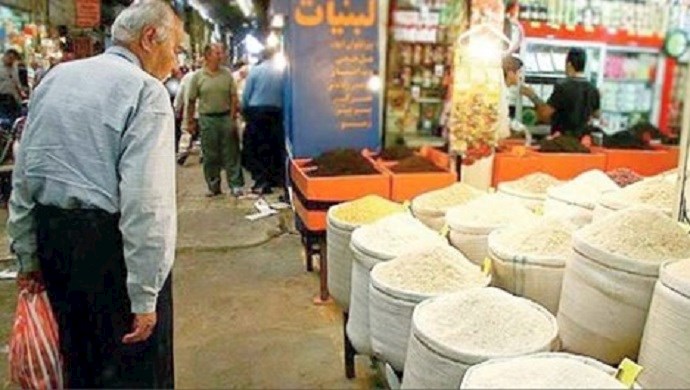Analyzing by PMOI/MEK
Iran, March 12, 2021—The skyrocketing prices of basic goods and the consequences they can have on the lives of the people and their social implications can entail has become the subject of heated debates among Iranian regime officials and state-run media.
On March 11, Tasnim News Agency, run by the Revolutionary Guards (IRGC), quoted interior minister Abdolreza Rahmani Fazli as saying, “High prices has caused many problems for the people.”
Majlis (parliament) speaker Mohammad Bagher Ghalibaf also acknowledged the “instability of prices” and expensiveness of basic goods such as poultry and made hollow promises of controlling prices in the coming year on March 10.
A few weeks earlier, Ali Hosseini Ashkouri, member of the Assembly of Experts, said on national television, “The people are in a difficult situation. This unbridled rise in prices is no joke. What is the reason?”
In such circumstances, as is his wont, regime president Hassan Rouhani, shrugged off any blame for the situation and said on March 9: “The high price of some goods is the result of vast sanctions.”
Meanwhile, other regime authorities are admitting that the real reason behind the country’s deep economic grievances is the regime’s own destructive policies.
Mohsen Rezaii, the head of the Expediency Council, said on March 6: “The economic mismanagement of the country must end. Since 2013 [the beginning of Rouhani’s presidency] until now, the people’s purchase power has decreased considerably. An important part of the problems is not due to sanctions but are due to management issues. Negligence has resulted in the devaluation of the country’s currency against foreign currencies. And you can see the conditions of the stock market. Economic managers claims that the people’s lives are spinning just as the centrifuges are. Hearing such things in these conditions is very disturbing.”
Ahmad Alamolhoda, the Friday prayer leader of Mashhad, also admitted that people’s lives have been badly hit by economic woes and said on March 11: “Today, we have many livelihood and economic problems. The issue of high prices has reached a point that [Khamenei] has raised concern about it. Are these problems because of U.S. sanctions? Sanctions might have an effect, but our problems are not because of them. Our social problems today are mostly due to the fact that the people who are running the country are not committed to jihad. If they were committed to jihad, we wouldn’t have had any of these problems.”
The expansion of poverty has resulted in meat disappearing from the tables of the country’s impoverished segments, and the middle class have considerably reduced their meat consumption. According to the Majlis research center, in 2019, the meat consumption of the middle class was 30 percent lower in comparison to 2016, the state-run ILNA news agency reported in November 2020.
While vital items such as meat, dairy product, poultry, and eggs disappear from the people’s tables, the tables of the ruling class continue to become more colorful and rich by the day.
On March 4, Aftab-e Yazd daily wrote, “The unfair distribution of wealth has not only resulted in the decline of comfort in the lives of a part of the society, but it has also affected other personal and social aspects of their lives.”
Aftab-e Yazd further elaborates: “When a worker can’t pay the basic expenses of living for his family, how is he expected not to suffer from negative consequences.”
Earlier, MP Mohammad Mehdi Farvardin had acknowledged during a Majlis session: “In addition to the coronavirus, we are seeing a much worse virus in high prices, discrimination, unbridled inflation, and the depreciation of the national currency, which has caused problems in the lives of the people and has targeted their spirit and sanity.”
The reality is that, as the regime’s officials directly and implicitly acknowledge, Iran’s economic problems is the result of the corrupt functions of four decades of rule of the mullahs. The people are fed up, and as we’ve seen in the past months, despite the heavy repression, despite the threat of the coronavirus, and despite many other problems, they have taken to the streets to protest the injustice, corruption, and tyranny of the ruling regime. They are fed up, they have nothing to lose, and they know that things can’t get any better while the mullahs are still in power.
As the Resalat newspaper warned on March 2, “One of the signs that the people’s survival is threatened is rage.”
And as a columnist for the state-run Jahan-e Sanat warned, the people’s rage is a “ticking time bomb” that will sometime burst and leave no sign of the rule of the mullahs.





